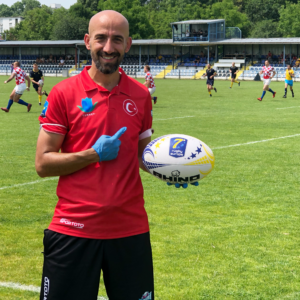As Associate Professor at the Sports Medicine Department of the Hacettepe University, Dr Gürhan Dönmez was invited to present his perspective on Sport & Exercise Medicine (SEM) in his home country, Turkey.

Tell us more about yourself
I have been working as a sports medicine physician in Turkey for about 15 years. I am a faculty member and an Associate Professor at the Department of Sports Medicine of Hacettepe University, one of the best medical faculties and institutions for medical education in Turkey.

I have been a team physician involved at the highest level of professional football for the last 7 years. In addition, I worked as a team doctor for the women’s football and basketball national teams and was a team doctor for the men’s national rugby and baseball teams. Furthermore, I published more than 30 research articles in international journals included in the Science Citation Index (SCI) Expanded. I am also a former general secretary of the Turkish Sports Medicine Association and a current associate editor of the Turkish Journal of Sports Medicine. Finally, as someone who has been involved in sports since childhood, I am grateful to combine my passion with my job while still living a physically active life.
What is the path to becoming a sport and exercise physician in Turkey, and what are the main hurdles on this path?
Although sports medicine became a medical specialty in the 1970s, I can clearly emphasize that it took a long time to develop it. Sports medicine is one of the specialties (like pediatrics, cardiology, neurosurgery, etc.) that can be chosen for the Specialization Exam in Clinical Medicine held after six years of basic medical school education. The educational plan for sports medicine is standardized, following a curriculum determined by the Turkish Expert Board in Medicine. There are currently nine universities in my country with sports medicine departments and provide sports medicine specialization training. After being awarded the degree of Doctor of Medicine, someone can gain a position as a research assistant in a department of sports medicine. After four years, the post-graduate residency program includes theoretical education, clinical practice with athletes, research projects, and post-graduate thesis.
We believe that it’s also valuable for our research assistants to practice field medicine as much as possible within their area of interest. Therefore, we try to create opportunities for them to work in positions at various sports clubs and national teams during their four years of education. They are also encouraged to participate in national and international scientific sports medicine congresses. However, since there is compulsory service in our health care system for medical doctors, our research assistants (fellows) commonly have to serve as physicians in another city for about two years.
Since sports medicine is a relatively new and not very well-known discipline, facilities are not standardized in each sports medicine department yet. This may cause inequality among doctors who receive their sports medicine specialization from different universities.
How developed is collaborative work in sports medicine in Turkey?
It is well known that sports medicine is in close relationships with several medical and non-medical disciplines due to its nature. Therefore, approximately 1.5 years of the four-year sports medicine education is reserved for rotations in other clinical disciplines such as orthopedics and traumatology, cardiology, physical therapy and rehabilitation, endocrinology, radiology, and emergency medicine according to the national medicine curriculum.
Additionally, in our daily practice, it is necessary to be in contact with non-medical professionals such as sports scientists, physiotherapists, nutritionists, and sports psychologists etc. One of our main goals is to train our fellows to have an opinion on almost any problem of an athlete through multidisciplinary meetings, scientific studies, and interdepartmental shifts. However, working with athletes remains important to get an expert opinion in some cases due to the nature of working with athletes. I think it is extremely important for health management of an athlete to be able to refer them to the correct professional for the proper indications.
Are exercise physiologists/scientists integrated into your healthcare system, and does health insurance cover their services?
Unfortunately, it is not the case for sports medicine units at universities or state hospitals. But sports scientists are an indispensable part of the team in professional sports clubs and national teams. Apart from this, some of the treatments prescribed or some physical therapy applications ordered by sports medicine specialists are neither covered by the insurance coverage of the Ministry of Health and nor by private health insurance companies. This is exactly one of the most serious problems for us in Turkey. Although professional athletes may overcome this situation, it can be quite difficult for amateur or recreational athletes to cover these costs.
What is done in Turkey to promote sports medicine among students and young professionals regarding research and clinical opportunities?
When I was a medical student, sports medicine was neither part of the elective internship program nor the medical school education curriculum. Fortunately, sports medicine internships are now available, and they provide theoretical and practical educational opportunities for students at universities having sports medicine departments. In fact, medical faculties that do not have a sports medicine department sometimes cooperate with us to educate their students about sports medicine. As medical students become aware of the existence of sports medicine as a discipline, they are increasingly interested in sports medicine. In fact, there has been an increasing demand for sports medicine in the Exam for Specialization in Clinical Medicine. Sports medicine is now one of the most popular disciplines in our country.
In my opinion, it is very, very important for the sake of public health that all medical faculty students receive a sports medicine internship program from trained sports physicians, especially to understand the benefits of physical activity and the crucial importance of exercise prescriptions for primary health services.
Finally, if you were Harry Potter, what would you change about SEM in Turkey?
We live in a country, which has only 150 sports physicians for a population of 84 million. I think that we need to target better recognition by other medical specialists but also within the population. Indeed, people still do not know what the definition of sports medicine is. They still feel difficult to understand how sports physicians differ from orthopaedic surgeons, physiotherapists or even sports scientists.
Thus, if I were Harry Potter, I would go to a sports physician for any health problem related to physical activity that I couldn’t solve by myself. I would then communicate how well my sports physician could help me solve the situation and recommend seeking a sports physician in similar cases. Thus, millions of people will easily see that sports physicians are sometimes ‘problem solvers’ like Harry Potter, even if they do not have magic wands.